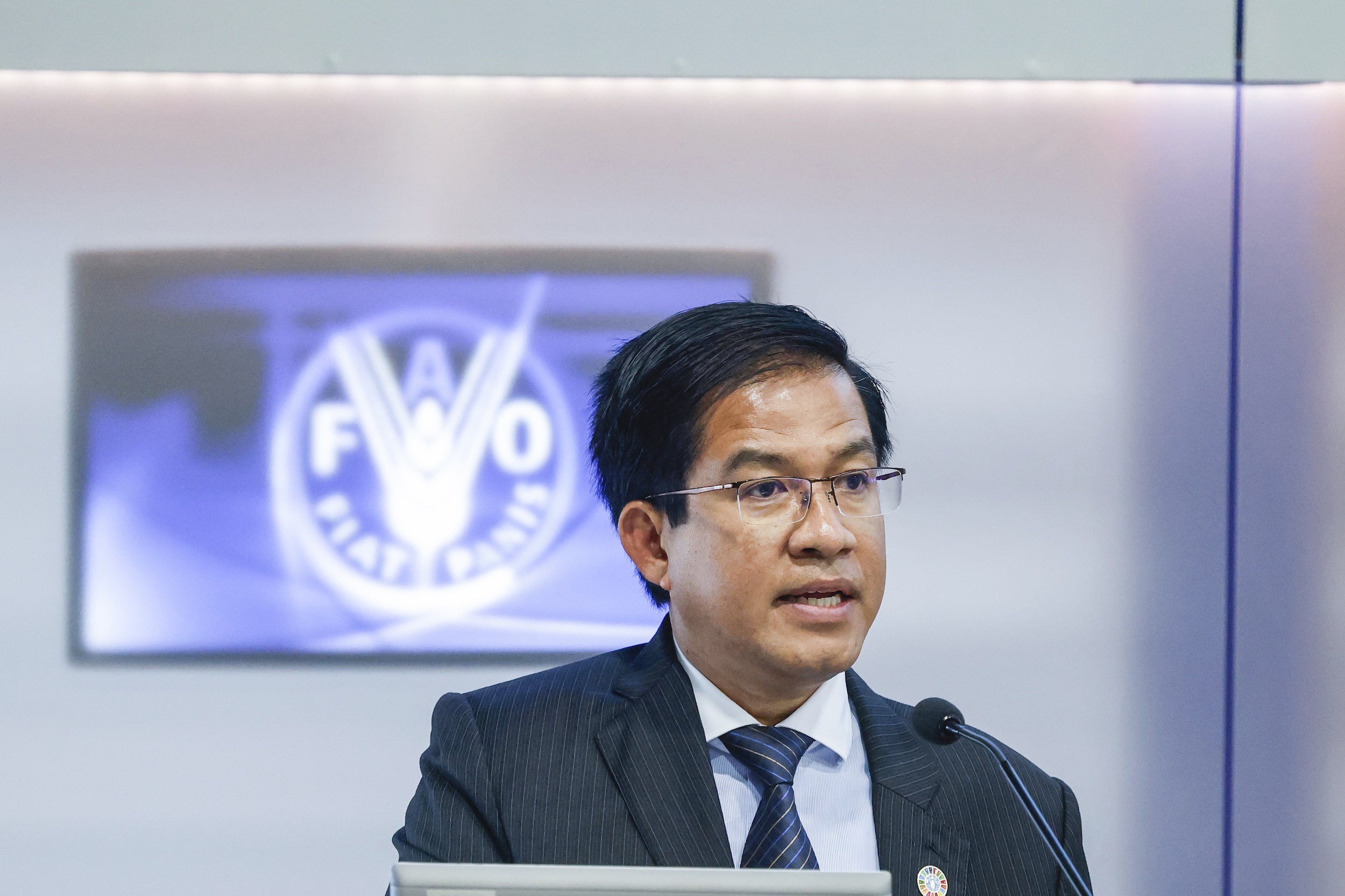FAO marks 30 years of success in fighting transboundary pests and diseases
Side event explores a sustainable future in combating transboundary pests and diseases

Side event “Towards a sustainable future: Leading the fight against transboundary pests and diseases”.
©FAO/Riccardo De Luca
Rome - As the world faces unprecedented challenges in food security, the Food and Agriculture Organization of the United Nations (FAO) marked a milestone in its fight against transboundary pests and diseases. On 25 September 2024, the Organization commemorated the 30th anniversary of its Emergency Prevention System (EMPRES) at the first ever FAO Global Conference on Animal Health Innovation, Reference Centres and Vaccines.
The special side event “Towards a sustainable future: Leading the fight against transboundary pests and diseases” recognized EMPRES's crucial role in responding to devastating locust swarms, preventing the spread of emerging livestock and zoonotic diseases, and containing plant pathogens.
Yurdi Yasmi, Special Coordinator of the FAO Plant Production and Protection Division, addressing the event said: “They are three decades of tireless efforts to safeguard both plant and animal health—two pillars of food and health security, livelihoods, and sustainable agriculture,” adding that “EMPRES served as the global frontline of defense”.
The EMPRES was established in 1994 as a Special Programme of the FAO Director-General to strengthen the emergency prevention capacity of countries affected by transboundary pests and diseases, to safeguard world food security.
Strengthening preventive control capacities of countries
The two phases of the EMPRES Desert Locust component implemented in the Central and Western Desert Locust regions between 2000 and 2009 made significant improvement of the preventive control capacity of countries, including the establishment of specialized and empowered locust control centres/units in the key breeding countries.
Through early warning systems, rapid response measures, and capacity building, FAO mitigated countless emergencies, saving crops, animals, ecosystems, lives and livelihoods in the process.
Keith Cressman, FAO's Senior Locust Forecasting Consultant, emphasized the importance of cutting-edge technology in EMPRES' work. "Adoption of state-of-the-art technologies is crucial in predicting and mitigating the threat before it becomes a crisis," he stated. Cressman stressed the need for international cooperation: "All of the data needs to be shared across national borders - both public and national partners have to work together to promote global cooperation."
A holistic approach to address pests and diseases
EMPRES laid the foundation for a One Health multi-disciplinary approach. Yasmi added: “In the years ahead, we must continue to strengthen the synergies between plant, animal human and environmental health sectors, recognizing that the health of one directly impacts the other."
The One Health approach will be central to FAO’s efforts, to better understand and respond to the emergence of pests and diseases, manage antimicrobial resistance, and build resilient systems that protect biodiversity while ensuring food security.

Yurdi Yasmi, Special Coordinator of the FAO Plant Production and Protection Division, addressing the event. © FAO/Riccardo De Luca
Strengthening partnerships and collaborations
The event called for more collaboration in all relevant sectors and key players, stressing that FAO cannot do this alone, and partnerships will remain key. International cooperation, combined with local expertise and knowledge-sharing networks, will be crucial in building capacity at all levels.
EMPRES encompasses five key components: animal health, plant protection, food safety, fisheries and aquatic health, and forest health. Its comprehensive approach covers prevention, detection, early warning, rapid response, coordination, and capacity building. The areas are central to FAO's mission to transform agrifood systems for better production, better nutrition, a better environment, and a better life, leaving no one behind.
As the event concluded, there was a shared understanding that the next 30 years would require even greater innovation, collaboration and dedication to ensure a sustainable and food-secure future for all.
Countries and partners shared their experiences
Panelists at the discussion included high-level representatives:
- Mark Rweyemamu, Executive Director, SACIDS Foundation for One Health;
- Paul Welcher, Agricultural Attaché, U.S. Mission to the UN Agencies in Rome; and
- Huyam Salih, Director, African Union – InterAfrican Bureau for Animal Resources (AU-IBAR).
In addition to Yurdi Yasmi and Keith Cressman, FAO speakers included:
- Madhur Dhingra, Senior Animal Health Officer; and
- Mona Chaya, Special Adviser, Chief Scientist Office;
Juan Lubroth, FAO Senior Expert (One Health), moderated the session.
